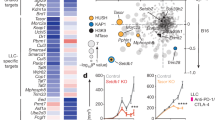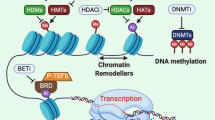Abstract
Functional inactivation of genes critical to immunity may occur by mutation and/or by repression, the latter being potentially reversible with agents that modify chromatin. This study was constructed to determine whether reversal of gene silencing, by altering the acetylation status of chromatin, might lead to an effective tumor vaccine. We show that the expression of selected genes important to tumor immunity, including MHC class II, CD40, and B7-1/2 are altered by treating tumor cells in vitro with a histone deacetylase inhibitor, trichostatin A (TSA). Tumor cells treated in vitro with TSA showed delayed onset and rate of tumor growth in 70% of the J558 plasmacytoma and 100% of the B16 melanoma injected animals. Long-term tumor specific immunity was elicited to rechallenge with wild-type cells in approximately 30% in both tumor models. Splenic T cells from immune mice lysed untreated tumor cells, and SCID mice did not manifest immunity, suggesting that T cells may be involved in immunity. We hypothesize that repression of immune genes is involved in the evasion of immunity by tumors and suggest that epigenetically altered cancer cells should be further explored as a strategy for the induction of tumor immunity.



Similar content being viewed by others
Abbreviations
- APCs:
-
antigen-presenting cells
- CIITA:
-
MHC class II transactivator
- CTLs:
-
cytotoxic T lymphocytes
- HDACs:
-
histone deacetylases
- LPAM:
-
L-phenylalanine mustard
- TSA:
-
trichostatin A
References
Basu S, Binder RJ, Suto R, Anderson KM, Srivastava PK (2000) Necrotic but not apoptotic cell death releases heat shock proteins, which deliver a partial maturation signal to dendritic cells and activate the NF-κB pathway. Int Immunol 12:1539
Bernstein BE, Tong JK, Schreiber SL (2000) Genome wide studies of histone deacetylase function in yeast. Proc Natl Acad Sci U S A 97:13708
Candido KA, Shimizu K, McLaughlin JC, Kunkel R, Fuller JA, Redman BG, Thomas EK, Nickoloff BJ, Mule JJ (2001) Local administration of dendritic cells inhibits established breast tumor growth: implications for apoptosis-inducing agents. Cancer Res 61:228
Chen L, McGowan P, Ashe S, Johnston J, Li Y, Hellstrom I, Hellstrom KE (1994) Tumor immunogenicity determines the effect of B7 costimulation on T cell-mediated tumor immunity. J Exp Med 179:523
Hicklin DJ, Marincola FM, Ferrone S (1999) HLA class I antigen downregulation in human cancers: T cell immunotherapy revives an old story. Mol Med Today 5:178
Huang K, Hayashi R, Lafond-Walker A, Lowenstein C, Pardoll D, Levitsky H (1998) The central role of CD4+ T cells in the antitumor immune response. J Exp Med 188:2357
Inaba K, Turley S, Yamaide F, Iyoda T, Mahnke K, Inaba M, Pack M, Subklewe M, Sauter B, Sheff D, Albert M, Bhardwaj N, Mellman I, Steinman RM (1998) Efficient presentation of phagocytosed cellular fragments on the major histocompatibility complex class II products of dendritic cells. J Exp Med 188:2163
Machiels J-PH, Reilly RT, Emens LA, Ercolini AM, Lei RY, Weintraub D, Okoye FI, Jaffee EM (2001) Cyclophosphamide, doxorubicin, and paclitaxel enhance the antitumor immune response of granulocyte/macrophage-colony stimulating factor-secreting whole-cell vaccines in HER-2/neu tolerized mice. Cancer Res 61:3689
Magner WJ, Kazim AL, Stewart C, Catalano G, Grande C, Keiser N, Romano M, Santaniello F, Tomasi TB (2000) Activation of MHC class I, II and CD40 gene expression by histone deacetylase inhibitors. J Immunol 165:7017
Marks PA, Rifkind RA, Richon VM, Breslow R, Miller T, Kelly WK (2001) Histone deacetylases and cancer: causes and therapies. Nat Rev Cancer 1(3):194
Narlikar GJ, Fan H-Y, Kingston RE (2002) Cooperation between complexes that regulate chromatin structure and transcription. Cell 108:475
Ostrand-Rosenberg S, Pulaski BA, Clements VK, Qi L, Pipeling MR, Hanyok LA (1999) Cell based vaccines for the stimulation of immunity to metastatic cancers. Immunol Rev 170:101
Piskurich JF, Lin K-I, Lin Y, Wang Y, Ting JP-Y, Calame K (2000) BLIMP-1 mediates extinction of major histocompatibility class II transactivator expression in plasma cells. Nature Immunol 1:526
Pulaski BA, Ostrand-Rosenberg S (1998) Reduction of established spontaneous mammary carcinoma metastases following immunotherapy with major histocompatibility complex class II and B7.1 cell-based tumor vaccines. Cancer Res 58:1486
Qi L, Rojas J-M, Ostrand-Rosenberg S (2000) Tumor cells present MHC class II-restricted nuclear and mitochondrial antigens and are the predominant antigen presenting cells in vivo. J Immunol 165:5451
Ramarathinam L, Castle M, Wu Y, Liu Y (1994) T cell costimulation by B7/BB1 induces CD8 T cell-dependent tumor rejection: an important role of B7/BB1 in the induction, recruitment, and effector function of antitumor T cells. J Exp Med 179:1205
Restifo NP (2000) Building better vaccines: how apoptotic cell death can induce inflammation and activate innate and adaptive immunity. Curr Opin Immunol 12:597
Rosato RR, Almenara JA, Grant S (2003) The histone deacetylase inhibitor MS-275 promotes differentiation or apoptosis in human leukemia cells through a process regulated by generation of reactive oxygen species and induction of p21CIP1/WAF1. Cancer Res 63:3637
Silacci P, Mottet A, Steimle V, Reith W, Mach, B (1994) Developmental extinction of major histocompatibility complex class II gene expression in plasmocytes is mediated by silencing of the transactivator gene CIITA. J Exp Med 180:1329
Smale ST, Fisher AG (2002) Chromatin structure and gene regulation in the immune system. Annu Rev Immunol 20:427
Soos JM, Krieger JI, Stuve O, King CL, Patarryo JC, Aldape K, Wosik K, Slaivin AJ, Nelson PA, Antel JP, Zamvil SS (2001) Malignant glioma cells use MHC class II transactivator (CIITA) promoters III and IV to direct ifn-gamma inducible CIITA expression and can function as nonprofessional antigen presenting cells in endocytic processing and CD4 (+) T-cell activation. Glia 36(3):391
Spiotto MT, Yu P, Rowley DA, Nishimura MI, Meredith SC, Gajewski TF, Fu Y-X, Schreiber H (2002) Increasing tumor antigen expression overcomes ‘‘Ignorance’’ to solid tumors via cross-presentation by bone marrow-derived stromal cells. Immunity 17:737
Stewart CC, Stewart SJ (1997) Immunophenotyping. In: Robinson JP, Darzynkiewiez Z, Dean P, Dressler L, Rabinovitch P, Stewart C, Tanke H, Wheeless L (eds) Current protocols in cytometry. Wiley, New York, p 6.2.1
Toes REM, Ossendorp F, Offringa R, Melief CJM (1999) CD4 T cells and their role in antitumor immune responses. J Exp Med 189:753
Yu J, Angelin-Duclos C, Greenwood J, Liao J, Calame, K (2000) Transcriptional repression by Blimp-1 (PRDI-BF1) involves recruitment of histone deacetylase. Mol Cell Biol 20:2592
Zheng P, Sarma S, Guo Y, Liu Y (1999) Two mechanisms for tumor evasion of preexisting cytotoxic T-cell responses: lessons from recurrent tumors. Cancer Res 59:3461
Acknowledgements
We thank Elizabeth A. Repasky and Protul Shrikant for critical review of the manuscript.
Author information
Authors and Affiliations
Corresponding author
Additional information
This work was supported by grant HD 17013 from the National Institutes of Health, and utilized core facilities supported in part by RPCI’s NCI Cancer Support Grant CA16056.
Rights and permissions
About this article
Cite this article
Khan, A.N.H., Magner, W.J. & Tomasi, T.B. An epigenetically altered tumor cell vaccine. Cancer Immunol Immunother 53, 748–754 (2004). https://doi.org/10.1007/s00262-004-0513-0
Received:
Accepted:
Published:
Issue Date:
DOI: https://doi.org/10.1007/s00262-004-0513-0




